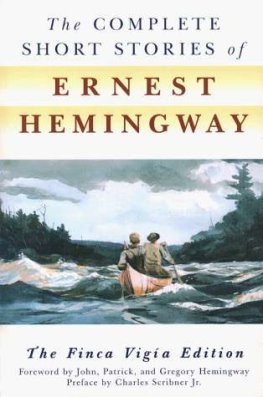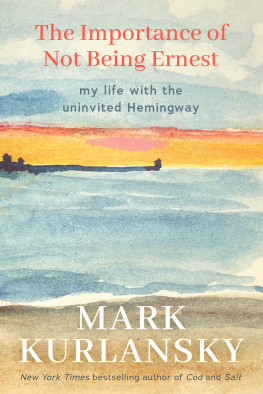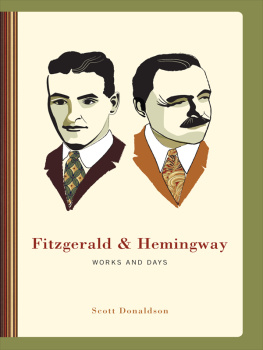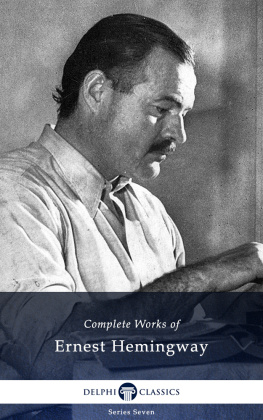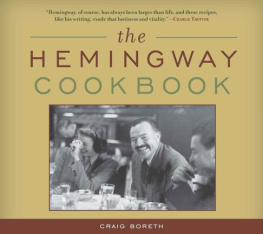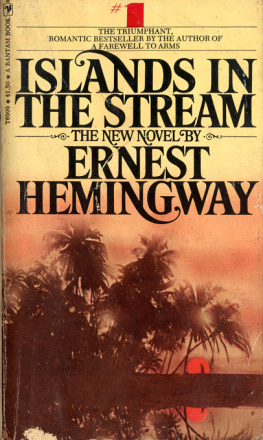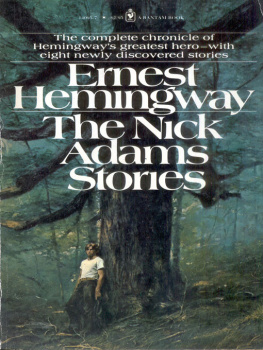The publication of this volume has been made possible by the generosity of the authors of the essays, and I am grateful to them and to the editors and publishers of the publications in which many of these essays originally appeared for their permissions. I have a particular debt of gratitude to Paul Smith who not only wrote the fine survey of criticism which is the centerpiece of this collection, but who also made many suggestions regarding the contents and reviewed the checklist in great detail. Finally, I would like to thank Anne Hunsinger and JoAnne Zebroski, fine teachers, writers, and researchers in their own right, for their years of work in assembling, arranging, and editing the extensive checklist at the end of this volumeheroines both.
Introduction
This volume is an all-new sequel to a previous collection, The Short Stories of Ernest Hemingway: Critical Essays, which was published in 1975. While a few of the essays here were originally published in the late 1970s, most were published in the 1980s and many in the last few years. In the first volume the Comprehensive Checklist (which broke new ground by listing the criticism by story) attempted to include all of the short story criticism, in English, from the beginning through the first part of 1975. The checklist at the end of this volume attempts to list all of the short story criticism from and including 1975 (not previously listed) up to early 1990. In doing so the checklist becomes the first comprehensive bibliography of Hemingway secondary materials published since Audre Hanneman published her Supplement to Ernest Hemingway: A Comprehensive Bibliography in 1975.
In my introduction I spoke of the checklist in the first volume as a monster which has haunted and nearly overcome its creator. With this new compilation, the monster became nearly unmanageable, as I and several assistants over three years struggled with a body of Hemingway short story criticism that had grown enormous. All of the articles published in all the years prior to 1975 are roughly equal in number to those published in the decade following, and the output in the last decade is nearly double that of the preceding decade. The process of selecting the essays for this volume involved reading, evaluating, and segregating by type and topic nearly four hundred essays, published as articles or in books, from which we have been able to publish twenty-eight (plus five written just for this collection and the overview essay). Obviously, for reasons of space and distribution of topic a good many excellent essays had to be omitted.
There are a number of reasons for the immense growth of Hemingway short story criticism. Most important, I think, has been the recognition in recent years that, despite the continued popularity of several of his novels, the short stories are Hemingways great contribution to our literature. In addition, the antagonism inspired by the Hemingway public persona, which had turned many academics and critics against his work, has gradually, nearly three decades after his death in 1961, dissipated. Indeed, the change in the authors standing has been dramatic, although it has come so gradually over the last two decades that few have stood back and commented on it.
Those of us who have written about the author for many years, however, can feel a definite shift in the atmosphere. A good number of bright young scholars are devoting some or all of their attention to Hemingway research, many more women have become involved, and several older, well-established scholars are coming back or turning to Hemingway studies for the first time. Clearly, it is no longer an embarrassment in intellectual circles to be identified as someone who has written about Hemingway, and suddenly those who write about him no longer feel the need to be as defensive of their subject as they once were.
Beyond the elevation of Hemingways status and the new talent this has attracted, there are other reasons why the short story criticism has not only expanded, but improved in quality from what in the mid-1970s appeared to be a criticism that was becoming sterile, ingrown, and repetitious. Perhaps the most important of these has been the availability, in the mid-1970s, of the Hemingway papers, first in temporary quarters and then at the Kennedy library. In addition, the process has no doubt been enriched by the publication of the Selected Letters in 1981, the previously unpublished On the Art of the Short Story (first published in the Paris Review and now reprinted in this volume) also in 1981, and, in more recent years, a series of new biographies and the posthumous publication of Garden of Eden. One stimulus has followed another in adding to our knowledge or altering our perspective of the man and his work.
The present volume is not only more substantial than the previous one, but its organizational pattern (which has since been imitated by other anthologists) has had to be altered to fit changes in the critical climate. The relatively recent concern with theory has turned our attention to methodology, the differences between critical approaches, and the philosophical underpinnings of critical processes. While the illumination of the short stories has been the primary criterion in my choice of essays, I thought it might be helpful to student and scholar, in order to respond to this concern, to display at the outset a wide variety of critical approaches, grouped together.
This section of the book contains some approaches which, like the semiotic analysis of Robert Scholes, reflect the strict application of a theory with a specific name; others, like the essay by William Braasch Watson, were given names by me to reflect the dominant approach as I perceived it. The essay by Nina Baym does not set out to apply a specific feminist theory to The Short Happy Life of Francis Macomber, but it obviously applies, as many essays in recent years have, a generalized, feminist perspective to the material. Unfortunately, not every approach one might desire is represented in the section, since there are no essays on the short stories using some types of theory, such as phenomenology or deconstruction.
Lying, as I have thought of it, halfway between critical approaches and interpretative essays on individual stories are those essays grouped under Section II which focus on techniques and themes, rather than particular stories, and which discuss ideas that can be applied to several stories or the stories as a whole. New critical approaches have been joined in recent years by what can only be viewed as a wave of revisionism, and several of the essays in this section reflect this in rebutting traditional assumptions and turning to new possibilities. For example, the essay by Kenneth Lynn questions certain long-accepted tenets of Hemingway criticism, as set forth by such early commentators as Malcolm Cowley and Philip Young, and proposes a different sort of inner landscape for the writer as reflected in his work.


